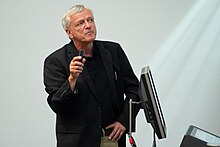Stefan Rose-John
Stefan Rose-John (born December 17, 1954 in Heidelberg ) is a German biochemist and professor at the Christian Albrechts University in Kiel .
Career
Rose-John studied biology at the University of Heidelberg with a minor in chemistry and physics. After receiving his doctorate in Heidelberg in 1982, he went to the DOE Plant Research Laboratory at Michigan State University in the USA with a research grant from the Max Kade Foundation and the German Research Foundation . After a time as group leader at the German Cancer Research Center in Heidelberg, he moved to RWTH Aachen University , where he qualified as a professor in 1992 in biochemistry. In 1994 he became professor for pathophysiology at Johannes Gutenberg University Mainz . Since 2000 he has been Professor and Director of the Biochemical Institute in the Medical Faculty of the Christian Albrechts University in Kiel .
Work areas
Rose-John works in the field of cytokines and their effects on inflammation and cancer. He was the first to describe what is known as interleukin-6 trans-signaling, in which the cytokine interleukin-6 (IL-6) can stimulate all cells in the body via the soluble IL-6 receptor. He was able to show that the pro-inflammatory activities of IL-6 take place via the soluble IL-6 receptor, while the IL-6 effects are more protective or via the membrane-bound IL-6 receptor, which is only expressed on a few cells in the body are regenerative in nature. Rose-John created several designer proteins that he used to explore the importance of the IL-6 trans-signaling pathway. Hyper-IL-6 is a fusion protein in which IL-6 and the soluble IL-6 receptor are covalently linked. The sgp130Fc consists of the extracellular part of the receptor subunit gp130, which is fused with the constant part of an IgG1 antibody. This protein specifically inhibits the IL-6 trans-signaling signaling pathway without influencing the IL-6 activities via the membrane-bound IL-6 receptor. The sgp130Fc protein has been further developed into a therapeutic protein and is currently being tested under the name Olamkicept in phase II clinical trials in patients with inflammatory bowel disease .
Prizes and awards
- Boltzmann Award for International Collaboration in Cytokine Research 2004
- Science Award of the City of Kiel 2005
- Member of the Academy of Sciences in Hamburg
- Albert Hasinger Lecture (German Rheumatism Research Center Berlin)
- Jacob Henle Medal from the University of Göttingen
Publications
Rose-John is the author or co-author of over 500 publications.
Individual evidence
- ^ S Rose-John, PC Heinrich: Soluble receptors for cytokines and growth factors: generation and biological function . In: Biochemical Journal . tape 300 , no. 2 , June 1, 1994, ISSN 0264-6021 , p. 281-290 , doi : 10.1042 / bj3000281 .
- ↑ Christoph Garbers, Sylvia Heink, Thomas Korn, Stefan Rose-John: Interleukin-6: designing specific therapeutics for a complex cytokine . In: Nature Reviews Drug Discovery . tape 17 , no. 6 , June 2018, ISSN 1474-1776 , p. 395-412 , doi : 10.1038 / nrd.2018.45 .
- ↑ Martina Fischer, Jutta Goldschmitt, Christian Peschel, Just PG Brakenhoff, Karl-Josef Kallen, Wollner A, Grötzinger J, Rose-John S: A bioactive designer cytokine for human hematopoietic progenitor cell expansion . In: Nature Biotechnology . tape 15 , no. 2 , February 1997, ISSN 1087-0156 , p. 142-145 , doi : 10.1038 / nbt0297-142 .
- ↑ Thomas Jostock, Jürgen Müllberg, Suat Özbek, Raja Atreya, Guido Blinn: Soluble gp130 is the natural inhibitor of soluble interleukin-6 receptor transsignaling responses . In: European Journal of Biochemistry . tape 268 , no. 1 , January 2001, ISSN 0014-2956 , p. 160-167 , doi : 10.1046 / j.1432-1327.2001.01867.x .
- ^ Science Award 2005: Prof. Stefan Rose-John and Prof. Stefan Schreiber. Retrieved March 26, 2020 .
- ↑ Members - Start. Retrieved on March 26, 2020 (German).
- ↑ Albrecht Hasinger Lecture 2017 - Schering Foundation. Retrieved on March 26, 2020 (German).
- ↑ News Detail. March 23, 2020, accessed March 26, 2020 .
| personal data | |
|---|---|
| SURNAME | Rose-John, Stefan |
| BRIEF DESCRIPTION | German biochemist and university professor |
| DATE OF BIRTH | 17th December 1954 |
| PLACE OF BIRTH | Heidelberg |
